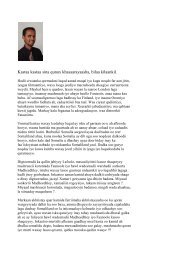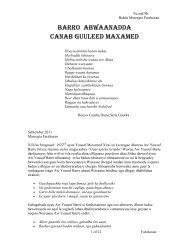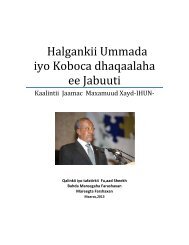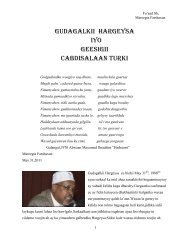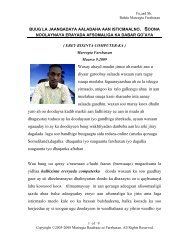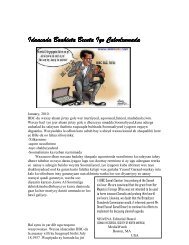Somalia: Illusory Political National-state - Farshaxan
Somalia: Illusory Political National-state - Farshaxan
Somalia: Illusory Political National-state - Farshaxan
You also want an ePaper? Increase the reach of your titles
YUMPU automatically turns print PDFs into web optimized ePapers that Google loves.
<strong>Somalia</strong>, although there always were a few rejectionists. It<br />
may seem strange for a tribal society accustomed to wander<br />
with its livestock to seek the formation of a political <strong>state</strong>.<br />
But it is exactly their ignorance of the intricacies of a <strong>state</strong><br />
that enabled the Somalis to agree to a unitary <strong>state</strong> which, as<br />
we shall see later, some embarked on dismantling im-<br />
mediately after the initial euphoria subsided. In any case,<br />
both Somaliland and <strong>Somalia</strong> decided to form a union. In<br />
the run up to the union, however, the Parliament of<br />
Somaliland and the Constituent Assembly of <strong>Somalia</strong><br />
approached the issue in divergent ways.<br />
In the short period of February through mid- April<br />
1960, the Somaliland Parliament passed important<br />
legislation, including an Act of Union, Somaliland and<br />
Somali Laws, laws of citizenship and international<br />
obligations, laws regarding treaties entered by the colonial<br />
administrators on behalf of Somaliland, boundary laws, and<br />
laws on a host of other issues. These were indeed<br />
remarkable achievements in such a short time, and indicate<br />
that Somalilanders wanted to have their own mark on the<br />
legal foundation for the subsequent union.<br />
The Somali Constituent Assembly in the south,<br />
however, did not prepare the legal basis for a union with<br />
Somaliland. Five years of internal rule and two elections<br />
seemed to have taught southern Deputies only the privileges<br />
of power and the richness of the exploits of office for the<br />
politically corrupt. Rather than enact an Act of Union and<br />
other laws for uniting two sovereign <strong>state</strong>s whose legal,<br />
financial and administrative systems were different, the<br />
Deputies of the Constituent Assembly were more<br />
preoccupied with securing apportionments to cabinet posts<br />
for clan members and other senior government posts in the<br />
nation to be proclaimed on July I, 1960. In the Mogadishu<br />
Conference of April 16-22, 1960, the Somaliland<br />
Parliamentary Committee unveiled to their southern<br />
counterparts the Somaliland Act of Union. Deputies of the<br />
Constituent Assembly were embarrassed by this and re-<br />
solved to make their own Act of Union. A Joint Committee<br />
of the two Parliaments was to have reconciled the two acts<br />
of Union thereby completing the legal union of the two<br />
<strong>state</strong>s. Unfortunately, <strong>Somalia</strong>'s Constituent Assembly never<br />
prepared its own act of union. It did, however, include in the<br />
transitory articles of its constitution provisions for a joint<br />
session of the two parliaments to elect a President and<br />
provision for a referendum on the constitution. From a legal<br />
point of view, then, the Union was never consummated.<br />
Nevertheless, Somaliland and <strong>Somalia</strong> were de-facto united<br />
on July<br />
1960 to form the Somali Republic. It is worth noting at this<br />
point that the absence of a legally binding act of union gave<br />
Somalilanders a cause to argue for secession as early as<br />
1961, and in 1991 this became the legal justification for<br />
withdrawal from the union and the refounding of the<br />
Republic of Somaliland.<br />
As Saadia Touval succinctly explains in his book<br />
Somali <strong>National</strong>ism, the Issaq of Somaliland were well<br />
aware that they would lose political power by joining<br />
<strong>Somalia</strong>, but everybody thought problems could be worked<br />
out with parliamentary democracy and elections. This hope<br />
was short-lived. As we shall see soon, tribal interests and<br />
those of the <strong>state</strong> do not necessarily converge. In any case,<br />
when the <strong>state</strong> of the Somali Republic came into being in<br />
July 1960, two-thirds of the <strong>National</strong> Assembly were<br />
southerners, and they elected a southerner as President of<br />
the Republic. The President in turn appointed a fellow<br />
southerner as Prime Minister. The Prime Minister formed a<br />
government dominated by southerners and all important<br />
portfolios like interior, foreign affairs, treasury and<br />
commerce, were given to southerners. This ushered in the<br />
initial dismay of Somalilanders with the union. Though<br />
Somaliland parted with its independence to integrate the two<br />
systems of the north and south, union was not to be easy.<br />
Major difference existed in the two systems. Somaliland<br />
practiced free trade, had a legal system based on Somali<br />
Customary Law, English Common Law, and the Indian<br />
Penal Code. Further, it had a well-structured financial<br />
system, an excellent civil service system and a small, welldisciplined<br />
army. <strong>Somalia</strong>, on the other hand, had a legal<br />
system modeled on Italian law, <strong>state</strong>- regulated trade with<br />
monopolies and parastatals set up for Italian settlers, an I<br />
talian type of financial system, an ill-disciplined and<br />
underpaid labor sys- tem, and no army of its own before the<br />
union day. These differences increased the disgruntlement<br />
of Somalilanders. The growing mood of discontent and even<br />
resentment was clearly expressed in the national referendum<br />
on the Provisional Constitution held in June 1961. The<br />
major political party in Somaliland, the Issaq-dominated<br />
Somali <strong>National</strong> League (SNL) boycotted the referendum.<br />
Accordingly, the majority of voters in Somaliland rejected<br />
the Provisional Constitution, but it was approved anyway by<br />
a landslide in southern <strong>Somalia</strong>, albeit through stuffing of<br />
ballot boxes in several districts.! I t was the view of the<br />
northerners that the union was already legally dead. The<br />
outcome of the referendum polarized the two <strong>state</strong>s-in-union<br />
and brought to the fore tribal dissatisfaction with the



